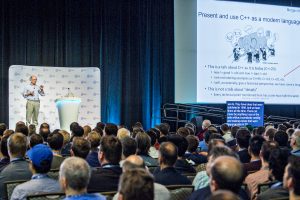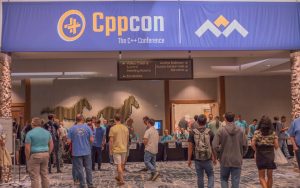As we state in our CppCon safety policy, we take all reports of an attendee’s misconduct seriously, even if it does not occur at CppCon but could affect other CppCon attendees. Our goal is to prioritize attendee safety in a way that recognizes the importance of your physical and psychological safety. We are committed to providing a safe and productive learning environment at CppCon.
In this follow-up post, we want to answer the questions we have seen regarding our case transparency report and safety policy, and to provide additional details about our rationale and approach. We address representative questions in the latter half of this post.
We regret and apologize that it took so long to finish a safety policy and post a transparency report. We worked as fast as we could, and although legal and consulting reviews always take surprisingly long, because this was the first time we had encountered such a situation they took even longer.
We have taken the situation described in the transparency report very seriously and have put a lot of time and effort into understanding various aspects of this problem. After imposing the initial restrictions for CppCon 2021, the board has focused on forming a policy well before CppCon 2022 registration opens that prioritizes the safety of our attendees above all else. We are also mindful of our responsibility to ensure no unlawful discrimination takes place in excluding someone from participating at CppCon. Exclusion from participation should absolutely occur when the attendee’s inclusion could threaten other attendees’ physical and psychological safety, but needs to follow appropriate guidelines (for example, per Washington Human Rights Commission regulations; see ACLU summary document pages 3 and 8).
Now that we have formed a policy for historical incidents and incidents outside of the conference scope, we have placed the implementation of that policy in the hands of the Code of Conduct (CoC) team. We appreciate this team’s good work because this is not an easy issue.
As always, we welcome suggestions and are looking into all those we have received so far. We are continuing our work on ways of making the Foundation’s work more transparent. For example, we recently started posting board meeting minutes.
We invite your comments as we continue our work to be both transparent and respectful. We know some may disagree with the decisions we have made and we want to hear from you, whether you agree or disagree. We assume good faith intentions from everyone and we ask that you avoid charged language and labeling. We promise to do the same. It is our fervent hope that we can come through this difficult circumstance in a way that teaches us better ways to communicate. We are learning a lot.
Please send any concerns or suggestions to the CoC team via conduct@cppcon.org. The CoC team will forward them to the directors, if you explicitly ask that.
Our door and our minds are open.
———
Q: How does your decision to remove the individual from attending the conference fit with your inclusion principles?
A: We followed our policy in judging whether this individual’s participation could threaten other attendees’ physical or psychological safety. While we do not believe a physical threat exists, we do believe the seriousness of the past felony could compromise some attendees’ psychological safety. As a result, we are not allowing this attendee to join the conference now. We do believe there are ways for this individual to safely contribute to the community, but more conversation needs to happen before such contribution should be attempted. The attendee is restricted from attending and/or giving talks until a time when the community is able to have those conversations.
Q: Why didn’t you post your restrictions until the day after the original social media post that publicized and heavily criticized this case?
A: The timing of that post understandably raises the question of why. In reality, we had been working on the transparency report and the safety policy it is based on for a number of weeks and we were in the final stages of approving those materials when the social media post appeared. They had already been reviewed on February 8 with the CppCon conference chair, CppCon program chair, and the Code of Conduct handling team, and what we posted has input from all of them.
Q: Why did the CoC team not handle this situation originally?
A: Because it required a new policy.
This case didn’t fall within the scope of the existing CoC policy, which covers the handling of all reports of misconduct at and around the conference. This case was an unprecedented situation that involved serious misconduct that occurred before the Foundation or CppCon existed.
Now that the safety policy exists, we have delegated full responsibility to the CoC team to enforce and apply it as they see fit for the future handling of this case, and any new cases like it if they should arise.
Q: Was the individual allowed to lead an informal gathering at CppCon 2021?
A: Yes, this was one of a number of “open content” gatherings that ordinary attendees are allowed to self-organize during the week.
In hindsight, this was not consistent with our intention to remove them from leadership roles. We did not have a clear definition of what “open content” is, and the intention was to remove them from conference organizational roles and speaking roles. Going forward, a leader of a gathering that appears on the conference schedule will be treated as equivalent to a speaker no matter how ad-hoc and informal it is intended to be, and someone who is restricted from being a speaker or panelist will also be restricted from leading anything else too. That’s a lesson we learned.
Q: Did you handle this offender with favoritism because you knew who they were?
A: No, we were very careful to avoid favoritism. During the period when the individual’s 2021 restrictions were being discussed, we were careful to avoid using the offender’s name because the board members who did not already know the offender’s identity asked not to be told. When forming the policy to apply to 2022, we were careful to create a general policy, not one with any individual case in mind, and we applied the policy as is to the situation.
Q: Is the individual removed from organizational roles? We heard otherwise.
A: Yes, they are. The individual was removed from all organizational roles in September 2021, and as far as we know this removal has been implemented and followed. Both the conference chair and program chair were informed immediately. The individual’s role has not been reinstated. We were informed that certain administrative things had not happened (e.g., that the individual’s name erroneously still appeared in one list on the website, and that their access to some internal files was not removed). The conference organizers have corrected these oversights; if you see anything else, please let us know.
Q: Is there truth in statements saying you removed restrictions from the individual?
A: No, we did not remove any restrictions. In September 2021, we applied initial restrictions to remove the person from all organizational roles indefinitely, and to cancel their talks for CppCon 2021. At that point, we had not made any other official decisions for future conferences due to the lack of policy. After finalizing the safety policy and evaluating the situation accordingly, we restricted participation for CppCon 2022. These are the only two official decisions pertaining to this individual, and the only two decisions that have been officially communicated to the organizers and CoC team. No private discussions in between those two decision points should be interpreted as changing restrictions; they were unofficial and likely to suffer from miscommunication, misunderstanding, and missing context.
Q: Is the Standard C++ Foundation the same as the CppCon conference?
A: The Foundation is a non-profit organization whose mission is to support the C++ software developer community and promote the understanding and use of modern Standard C++ on all compilers and platforms. The CppCon conference is one of the projects of the Foundation to accomplish its mission. The day-to-day operation of the conference is done by a team of conference leaders. For additional details, please see isocpp.org/about.
— Board of directors, Standard C++ Foundation

 Again this year, CppCon is running a Diversity & Attendance Support Ticket program. These free tickets are for people who would not be able to attend otherwise. This is an open program, but reasons to apply may include financial assistance, that you are part of an underrepresented group in tech, and others.
Again this year, CppCon is running a Diversity & Attendance Support Ticket program. These free tickets are for people who would not be able to attend otherwise. This is an open program, but reasons to apply may include financial assistance, that you are part of an underrepresented group in tech, and others. Registration
Registration
 Visa application support for non-US attendees
Visa application support for non-US attendees 